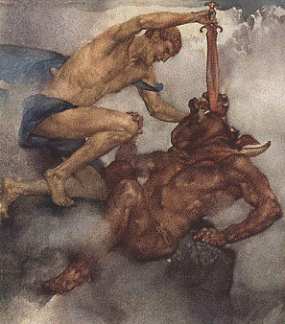Our television died last weekend.
My parents had a 70’s-era Sony for 25 years. Our JVC lasted only 11. Bought it for my wife when we were engaged. (The vacuum my parents bought us for our wedding croaked this last summer. Thankfully, the marriage still holds up.)
Toward the end of our TV’s life, the favored fix for its tendency to scrunch the entire image down to a line a quarter-inch thick across the middle of the screen consisted of an authoritative whack to its cabinet. Kapow! and the picture would balloon to normal size. Over the last six months, it resembled a speed bag more than a television. Last Saturday, no amount of throttling on my part could bring it back.
Given that a new television compliant with the FCC-mandated digital requirements will set us back a minimum of $750, we may simply have to do without. It’s just the way things are right now.
Though I wish things were not that way, my television viewing’s fallen off to a limit approaching zero since The X-Files went off the air, anyway. Back during its network run, I taped nearly every episode, my devotion to the show evident in my inability to participate in any event that coincided with it, for fear some drunk would crash into a power line somewhere and erasing my carefully crafted programming of the VCR. That, of course, didn’t happen—except on the one night I had no choice but attend an event. The episode in question just so happened to be the infamous inbred family one, which FOX elected never to run again. Ever. Of course.
But that slavish devotion taught me never again to surrender time to TV. I haven’t followed anything since and probably never will.
(Readers: “So, Dan, where does this boring intro actually lead?”)
Imagine a campfire on the plains of Palestine circa 200 AD. A dozen people gather ’round its warmth, trading stories. At one point, the elder of the group stands up and tells of Jesus, His ways, and how those ways became the ways of their people. He talks for an hour, while the younger ones trade questions with him, learning, absorbing. Tomorrow night, the conversation will be similar, but varied enough to take others to a fractionally deeper place than the night before. The faces might be different this night, the main storyteller another of the wise ones, but what lingers in the cooling night air contains the same truth, the same life-giving wisdom.
On some nights, stories surrender to music. But the music doesn’t jar with the oral traditions. No, it reinforces truth, resembling what was taught and told, only in words set to rhythm and melody.
Night after night, this is how it unfolds for those people. This is their entertainment and their revelation.
My parents’ generation was the first to adopt television. I will argue that theirs was the first with a soundtrack from cradle to grave, too. They embodied the first completely media-savvy generation.
And for that reason, my generation got ripped off. My son’s generation will be, also. And his son’s.
Media stole the passed torch. It distracted those who came before us from their primary duty of ensuring the wisdom of the ages survived into the next generation. Whatever that wisdom may have been, that generation preferred the dull gray light of a cathode ray tube, or the voice of a box of transistors, to passing on the only things worth saving.
In time, their newly adopted habits combined with the islandization of the cities and the suburbs to destroy community as known by the denizens of Palestine 200AD. Work habits changed, and employment moved far from home. Every day. Connections withered. Who we were supposed to be in our souls got lost amid The Honeymooners and Little Richard.
My entire twenties consisted of the relentless drone of young Christians around me repeating the the same mantra over and over: “I wish I could find a mentor.” Sorry, but the mentor couldn’t pry himself away from Charlie’s Angels.
But who could blame him? He slaved in an office in some nondescript tower of glass and steel all day, had no one pouring life back into him, so what did he have to give at the end of the day? Better just to tune into Laugh In and tune out for an hour or two than to step out of the cultural programming and back into something older and more lasting.
I look around today and can’t help but think it’s infinitely worse. Cruise the Godblogosphere long enough and it seems like everyone’s glued to a 50″ plasma display OR an iPod OR a PS3 OR the two dozen flicks at the multiplex OR some pointless Internet distraction. Meanwhile, the next generation’s holding out their hands, dying for what little got passed on to us.
So the threads of tradition thin and weaken. Trivia replaces wisdom. Words lose to throwaway images.
Meanwhile, the thief breaks in to steal and destroy. And he plunders the entire house because the homeowner couldn’t pry his attention away from Lost or American Idol or 24 or some other pointless entertainment guaranteed to burn on Judgment Day.
Hey, I know that’s a tough word, folks, but we’re fiddling while America burns. It’s one thing for Christians to be culturally-savvy in cultural distinctives that last for generations, but quite another to be so enamored of pop-cultural artifacts that won’t stand up to a decade’s time.
If the best we can give our kids when they move away from home is the complete DVD collection  of The Office or our Radiohead box-set, how is Jesus going to get a word in edge-wise?
of The Office or our Radiohead box-set, how is Jesus going to get a word in edge-wise?
But He’s Jesus, right? He’ll find a way to compete!
Can we hear ourselves? What life is going to flow into those kids? And into their kids?
My generation got mugged on the way to “maturity.” My parents did a decent job and were good people, but they still suffered from media distractions. They fell prey to disconnection and fractured community. My mother’s generational wisdom should’ve fed me, but by the time I realized I needed it, she was too far gone to help. And I didn’t know I needed it because I was too lost in my own media-driven stupor. Because the generation before me was, too. It was all I knew.
In the end, the torch I should be passing on to my child resembles a paper matchstick.
All that wisdom—gone. When my parent’s generation dies off entirely, so goes heritage, at least for many like me. We won’t remember all the second and third cousins. We won’t know how Christ changed that one great-uncle. Those salvation stories won’t be repeated around campfires any longer. The Bible passages that changed a generation will retreat into the book, to be remembered no more. And the hard-earned wisdom gained through decades of walking with Christ will blow away like dust along with the folks who learned it through bloody prayer, but took it to their graves.
What a grievous loss!
I wish we could grab our old people by the lapels and beg, “Don’t die before you instill in us what you learned about Christ. If you’ve been to the secret places, show us how to get there, too!” Don’t leave our generation to reflect on what might have been!
You know what I wish more of us did on Sunday? Rather than the same old, same old, why not begin a quarterly recollection Sunday (and center it around a full church meal and communion), where people tell stories of how Jesus changed their lives. How He came through and led out of the darkness. Have our kids hear those stories from people besides us for a change. Show them the relevancy of Christ from one generation to the next. And please God, send the fire on us so those stories burn with miracles and deliverance and the kind of supernatural power that proves to the next generation that “Awesome God” isn’t just a tired old song on the radio.
Because that’s the kind of thinking we must resurrect if the generation that follows us is going to have any sense of purpose and history to pass on to their children.
{Image: Rembrandt—Jacob Blessing the Children of Joseph, 1656}

 That kind of carelessness may be the foot that stomps out the Holy Spirit, not only in the life of the businessperson, but in his or her client's life, as well.
That kind of carelessness may be the foot that stomps out the Holy Spirit, not only in the life of the businessperson, but in his or her client's life, as well. Over the last week, we've been looking at commonly heard statements about Christianity that have taken on mythical proportions. It's hard to be a Christian in the West and not encounter these myths:
Over the last week, we've been looking at commonly heard statements about Christianity that have taken on mythical proportions. It's hard to be a Christian in the West and not encounter these myths: